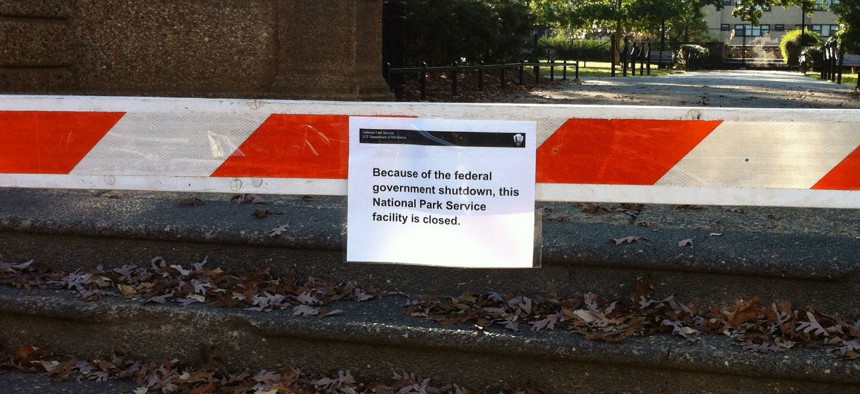
Flickr user justgrimes
Employees Exiting Closing Agencies Say Shutdown Procedures Are Quick
Street interviews suggest talking to reporters is a no-no.
Federal employees at five agencies, some cheerful, others gruff, told a Government Executive reporter on Monday morning that procedures for an “orderly” and “safe” shutdown are accomplished in surprisingly little time.
“I signed the furlough papers and was instructed not do to any work until further notice,” said an Interior Department employee who, like nearly all who were approached on the sidewalk, spoke without giving their name. “The whole thing took 15 minutes, and it took longer to log onto the computer than to sign the letter.”
At the State Department, “We were required to come in and report to a conference room, where we were handed a letter of furlough and had to sign an acknowledgement,” said a woman. “We were told it would take an estimated four hours, but as soon as they took the letter, we were told to leave the premises immediately.” That was “disheartening,” she added, noting that her colleagues are “conscientious, but the computers were not working.”
At the Office of Personnel Management, a reporter talking with employees on the plaza in front of the employee and visitors entrances was told politely by a security guard (after handing over a business card) that an interviewer could not approach people “on government property, but only on the sidewalk” further out. That allowed many departing staffers to avoid contact by exiting to one side. And many who were approached evidenced that they had been instructed not to speak, referring any inquiries to the communications department.
“Can’t talk.” “Would rather not.” “I don’t know anything about it, actually.” “You know the drill, I could get in lots of trouble,” were among the responses.
An exception was Steve Hardgrove, chief of staff for the Interior Department’s Office of Inspector General—which is 100 percent furloughed. He said he was “out for a cup of coffee because the cafeteria is closed.” His shutdown drill included “a conference call with all managers nationwide,” timed so that his West Coast colleagues have time to wake up.
Employees were more upbeat at two other agencies in the same Northwest Washington Foggy Bottom neighborhood. Outside the Consumer Financial Protection Bureau, which gets its funding through the Federal Reserve, an employee said, “We’re not shut down, we’re on mandatory spending.”
At the General Services Administration—where only 3.8 percent are furloughed, an employee said, “We’re open using no-year funds.” (Some of those 3.8 percent appears to include the webmaster, since GSA’s website on Monday had a notice “As a result of a temporary government shut down, portions of this website are not being updated at this time.”)
Another Interior employee, who came in just to sign her furlough notice and re-record her “out of office” voicemail message, said, “We’ve been through this before.” Still, “it’s unpredictable,” her colleague added. “Congress, by not doing their job, is forcing people not to do their job,” he said. Both said they would like to be doing their jobs.
Two State Department security staffers who are exempted said, “A lot of people didn’t come in today,” judging by the relatively sparsely populated 23rd Street entrance. Another exempted State security official asked the reporter, “What happened? Everybody reported to work and then were told to go home? Wow!”
The woman State Department employee said, “The buzz is a lot more pessimistic this morning than hopeful for a deal.” Her colleagues are asking, “How can you can negotiate a deal under Trump when he always has to win?”
This employee was carrying her government-provided Blackberry. “We’re supposed to power it down,” she said. But there is supposed to be an allowance for “incidental emergencies.” Since she has her children’s school emergency phone numbers on it, she said she would turn it on anyway. “It’s not very practical in 2018 to say don’t turn on your device.”
Sign up for GovExec newsletters and alerts and download our app to stay informed.







